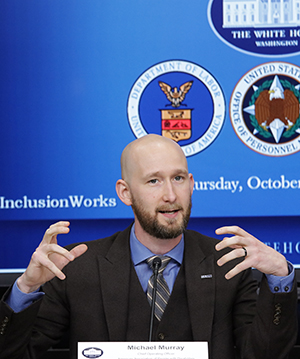The Future of the ADA: Making Strides in Self-determination
July 28, 2020

By Michael Murray, GT Independence
The Americans with Disabilities Act was signed into law 30 years ago this July. For those of us with disabilities starting out in the world at that time, we grew up with the security and knowledge that the ADA had our backs. As part of the “ADA generation,” we had the right to the same opportunities as everyone else. The ADA was a turning point for millions, but much work remains to ensure everyone has the freedom to live the lives of their choosing.
As a member of the ADA generation, I never viewed my disability as a negative. Rather, living with a disability and being raised by a father with disabilities enriched my perspective of the world and contributed meaningfully to various aspects of my life. Growing up, my father demonstrated that disability is a natural part of the human experience, much as race or gender. It was from my father that I began to learn the power and beauty of disability diversity.
Our country took a major step toward fulfilling the fundamental American promises of equal access, equal opportunity, and equal respect for all when the Americans with Disabilities Act (ADA) was made the law of the land. Despite the law, however, change was slow to materialize, and many in the disability community largely continued to be relegated to institutions and group homes for their long-term care needs. For example, my father had a difficult time finding healthcare support that would allow him to continue living in the community. My father would often be forced to spend months at a time in large institutions or nursing homes due to a lack of community options, even though these options were far more expensive. It wasn’t until 1999 and a Supreme Court decision in Olmstead vs. L.C. that the institutional isolation of people with disabilities was recognized as a form of unlawful discrimination.
The Olmstead decision affirmed that all have the right to live in a community of their choosing. Although another big step in the right direction, the Olmstead decision has not spurred the rapid shift away from institutionalization. This remains the default option, forcing my brothers and sisters with disabilities into congregate settings and removing their fundamental rights as Americans. Along with removing our right to choose how and where to live, congregate settings are a huge financial suck on the healthcare system. Even more, as COVID-19 has demonstrated, these congregate settings can be downright dangerous.
As the ADA celebrates 30 years, I believe an underutilized tool in our fight for freedom and equality is self-determination. Self-determination describes how a person with a disability receives community-based services. At its core, self-determination is all about freedom to choose how they live their lives.
With self-determination, I am the boss. I decide who comes into my house. I decide how they provide my services. I control the budget from Medicaid to determine the best way to administer these services. In every way, self-determination exemplifies nothing about us, without us.
Studies have shown that self-determination can provide multiple benefits, both in terms of cost considerations and quality of life. In the 1990s, an 18-state pilot program funded by the Robert Wood Johnson Foundation found that self-directed long-term service and support resulted in better health outcomes at the same, if not lower, costs than traditional arrangements. A later study indicated self-directing participants are up to 90% more likely to be very satisfied with how they lead their lives (Carlson, Barbara, Lepidus, et al. 2007), and another showed self-direction generating cost savings of 12.4% to 15.5% compared to traditional service arrangements (Conroy, Crowley, Rankin 2014).
Today, all 50 states have self-directed programs in place. To truly make self-determination a reality for the many who can benefit from it, we need to work on educating individuals and their caregivers while providing tools and resources to ease people through the process. With self-directed care, individuals are placed in the position of hiring their own support staff, thus choosing with whom they associate, how and where. As can be imagined, the documentation and payment of such services—particularly for those who rely on Medicaid—can be overwhelming.
Working for GT Independence gets me fired up to fight for the freedom of all people with disabilities. Together, we will continue a movement of equality and justice for all.
Michael Murray is chief relationship officer for GT Independence, a national leader in financial management services for self-directed in-home and community-based care. GT Independence is a family-owned, self-determination service provider founded on the belief that everyone should be able to choose how they live their lives and with whom they associate. As a disability-owned business, GT Independence was built by and for people with disabilities. As we look ahead to the next 30 years of the ADA, GT Independence looks forward to providing the guidance and compliance support needed to ensure we can live life on our terms and caregivers can focus on providing quality assistance.